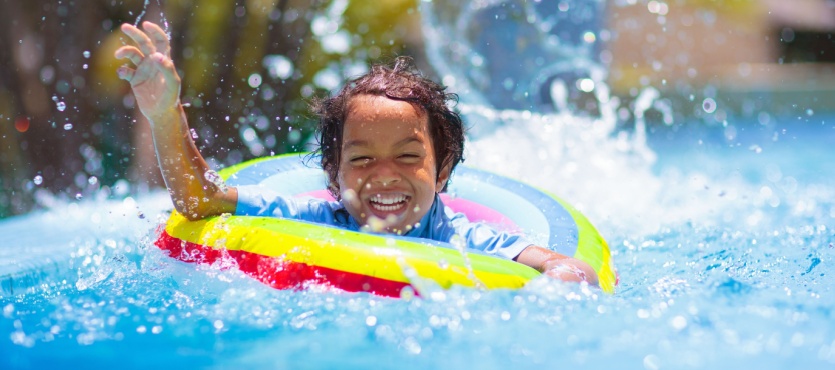Swimming is more than just a fun summer activity; it is a comprehensive exercise that provides numerous physical, mental, and emotional benefits for children. As one of the few sports that can be enjoyed from infancy through adulthood, swimming not only promotes lifelong fitness but also offers a unique combination of aerobic exercise and resistance training. Whether it’s a leisurely swim in a pool, a structured lesson, or a competitive swim meet, children can gain invaluable skills and health benefits from swimming.
Physical Benefits
Full-Body Workout: Swimming is a full-body exercise that engages various muscle groups. It improves cardiovascular health, strengthens muscles, and enhances flexibility and endurance. The resistance of water makes muscles work harder without putting stress on the joints, making swimming an excellent low-impact exercise. This is especially beneficial for children, as their bodies are still growing and developing. The buoyancy of water supports the body, reducing the risk of injury while providing an effective workout. Swimming also enhances lung capacity and respiratory function. Regular swimming exercises the lungs, improving their efficiency and capacity over time. This can be particularly advantageous for children with asthma or other respiratory conditions, as the humid environment of a pool can reduce symptoms and make breathing easier.
Improved Coordination and Balance: Swimming helps develop motor skills, coordination, and balance. The different swimming strokes require coordinated movements of the arms, legs, and head, which enhances overall body coordination and spatial awareness. These skills are transferable to other sports and physical activities, contributing to a child’s overall physical development. As children practice and master various swimming techniques, they improve their proprioception, or awareness of their body’s position in space, which is crucial for balance and coordination.
Boosted Immune System: Regular swimming can improve a child’s immune system. The exercise stimulates circulation, increases lung capacity, and promotes overall physical health, which can help fend off illnesses and improve a child’s ability to recover from sickness. Moreover, exposure to different temperatures in and around the pool can help strengthen the immune system by encouraging the body to adapt to varying conditions.
Mental Benefits
Enhanced Cognitive Function: Research indicates that swimming can boost brain function. The cardiovascular exercise involved in swimming improves blood flow to the brain, which can enhance cognitive function, memory, and learning abilities. This is particularly beneficial for school-aged children, as improved cognitive function can lead to better academic performance. Swimming also promotes the release of endorphins, which can improve mood and reduce feelings of stress and anxiety, further supporting cognitive health.
Stress Relief and Relaxation: Swimming has a calming effect on the mind. The rhythmic nature of swimming, combined with the soothing properties of water, can reduce stress and anxiety. This relaxation can improve a child’s mood and emotional well-being. Additionally, the sensory experience of being in water can be soothing for children, providing a peaceful environment that encourages relaxation and mindfulness.
Emotional and Social Benefits
Learning to swim and mastering new skills in the water can boost a child’s confidence and self-esteem. Overcoming challenges and achieving goals in swimming can provide a sense of accomplishment and pride. This positive reinforcement can encourage children to set and pursue other goals, fostering a growth mindset and resilience. Participation in swimming competitions or earning swimming badges can also boost self-esteem by providing tangible evidence of their progress and skills.
Swimming lessons and swim teams provide opportunities for social interaction and teamwork. Children learn to communicate, cooperate, and support each other, which can enhance their social skills and build lasting friendships. Swimming can be a highly social activity, whether it involves participating in a swim team, taking group lessons, or simply playing with friends in the pool. These interactions can help children develop important social skills such as empathy, communication, and cooperation.
Safety and Lifelong Skills
Swimming teaches essential water safety skills that can prevent drowning and other water-related accidents. Knowing how to swim can significantly reduce the risk of drowning, which is particularly important for children who live near water or spend a lot of time in aquatic environments. By learning to swim, children also become more aware of the potential dangers of water and how to navigate them safely, which can be lifesaving skills.
Swimming is a skill that can be enjoyed throughout life. By learning to swim at a young age, children can develop a lifelong habit of physical fitness and enjoy the numerous health benefits that come with regular swimming. Unlike many other sports, swimming can be practiced at any age and fitness level, making it a valuable skill for maintaining health and wellness throughout life. Additionally, swimming provides a low-impact way to stay active, which is especially beneficial for older adults or those with joint issues.
Making Waves
Swimming is a powerful activity that offers a wide range of benefits for children. From physical fitness and improved coordination to enhanced cognitive function and emotional well-being, the positive effects of swimming are vast. Encouraging children to swim can lead to a healthier, happier, and more confident lifestyle. For more information about introducing your child to swimming, visit Camp Live Oak’s contact page.

